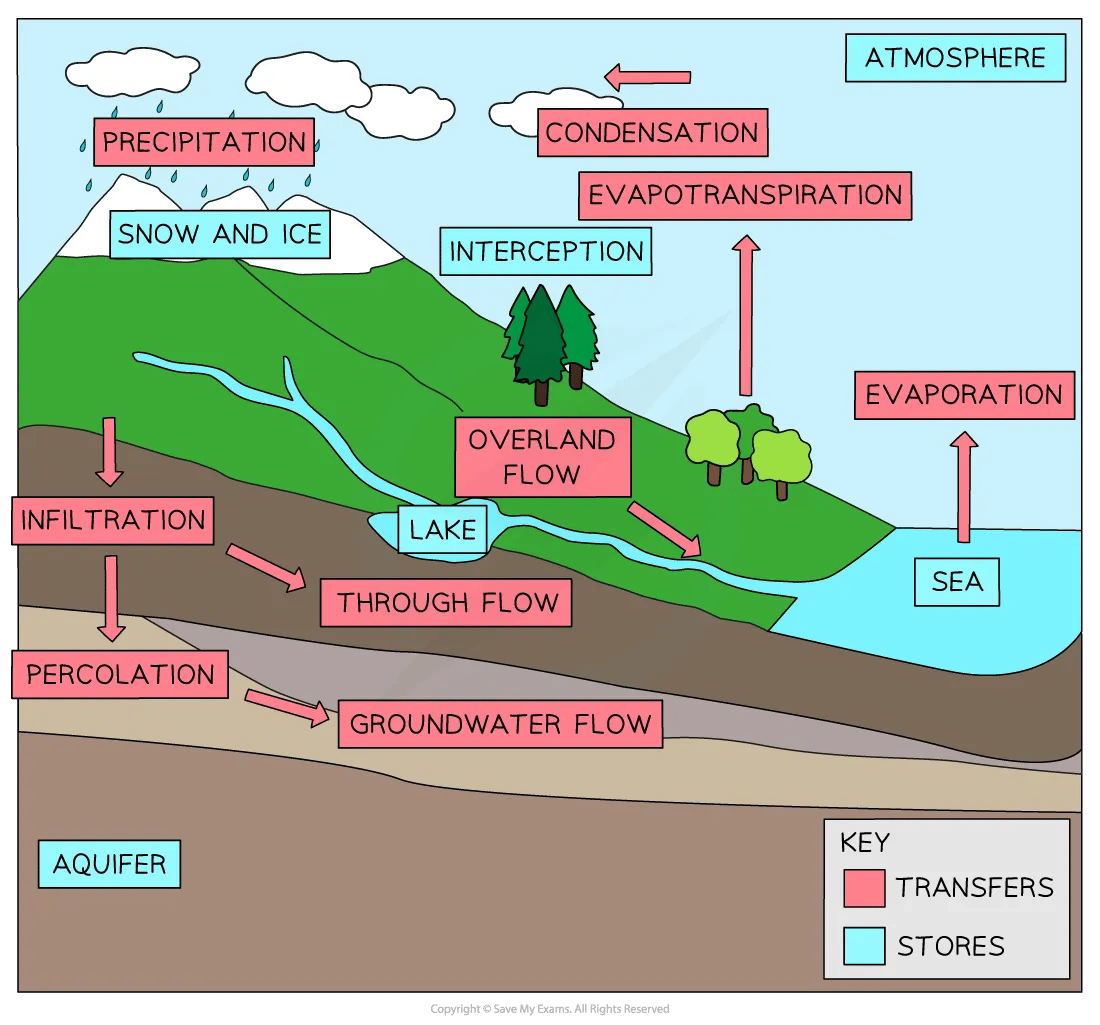The Water Cycle (Cambridge (CIE) AS Environmental Management)
Revision Note

Author
Alistair MarjotExpertise
Biology & Environmental Systems and Societies
Water Cycle Processes
Water on Earth
Fresh water only makes up a very small fraction (approximately 2.5% by volume) of the Earth’s water storages
The rest is saltwater
Of this fresh water, approximately 68.7% is stored in glaciers and ice sheets and 30% is stored as groundwater
The remaining 1.3% of freshwater is in rivers, lakes and the atmosphere
All water (both saltwater and freshwater) is part of the water cycle

Water Cycle
Globally, the water cycle is a closed system
This means that there is a constant amount of water on the planet
Within the water cycle, there are stores and transfers
The water cycle is a series of processes in which water is constantly recycled through the system
The cycle also shapes landscapes, transports minerals and is essential to all life on Earth
The main processes (transfers) occurring within the water cycle are:
Evaporation - the sun evaporates surface water into vapour
Condensation - water vapour condenses and precipitates
Flows - water runs off the surface into streams and reservoirs or beneath the surface as groundwater flow
These processes transfer the water on Earth from one store to another (e.g. river to ocean or ocean to atmosphere)
The water cycle involves energy exchange, leading to local temperature fluctuations
As water evaporates, it absorbs energy from its surroundings
This effectively cools the environment
The reverse happens when water condenses (heat is released)
This heat exchange influences the local climate

Storages & Processes
Storages in the water cycle include:
Rivers, lakes and oceans
Groundwater (aquifers)
Soils
The atmosphere
Glaciers and ice caps
Organisms (e.g. trees)
The main processes in the water cycle include:
Condensation
Precipitation
Interception
Infiltration
Surface run-off
Through-flow
Groundwater flow
Transpiration
Evaporation
Water Cycle Processes
Process | Description |
|---|---|
Condensation | The process through which water vapour in the atmosphere transforms into liquid water, forming clouds or dew, as a result of cooling |
Precipitation | The process of water falling from the atmosphere to the Earth's surface in the form of rain, snow, sleet, or hail |
Interception | The process through which precipitation is prevented from reaching the ground, usually by being caught on leaves or branches |
Infiltration | The process of water seeping into the soil from the surface, entering the soil layers and becoming groundwater |
Surface run-off | The movement of water over the Earth's surface, typically occurring when the ground is saturated or impermeable, leading to excess water |
Through-flow | The movement of water through the soil between the groundwater store (water table) and the surface |
Groundwater flow | The movement of water through underground rock layers |
Transpiration | The process by which plants absorb water from the soil through their roots and release it as water vapour through tiny openings called stomata in their leaves |
Evaporation | The process by which liquid water changes into a gaseous state (water vapour) and enters the atmosphere from water bodies such as oceans, lakes, and rivers |


You've read 0 of your 0 free revision notes
Get unlimited access
to absolutely everything:
- Downloadable PDFs
- Unlimited Revision Notes
- Topic Questions
- Past Papers
- Model Answers
- Videos (Maths and Science)
Did this page help you?